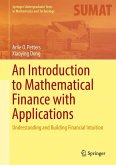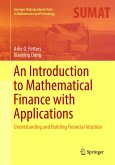Over the past decade the financial and business environments have undergone significant changes. During the same period several advances have been made within the field of financial engineering, involving both the methodological tools as well as the application areas.
This comprehensive edited volume discusses the most recent advances within the field of financial engineering, focusing not only on the description of the existing areas in financial engineering research, but also on the new methodologies that have been developed for modeling and addressing financial engineering problems.
This book is divided into four major parts, each covering different aspects of financial engineering and modeling such as portfolio management and trading, risk management, applications of operation research methods, and credit rating models.
Handbook of Financial Engineering is intended for financial engineers, researchers, applied mathematicians, and graduate students interested in real-world applications to financial engineering.
This comprehensive edited volume discusses the most recent advances within the field of financial engineering, focusing not only on the description of the existing areas in financial engineering research, but also on the new methodologies that have been developed for modeling and addressing financial engineering problems.
This book is divided into four major parts, each covering different aspects of financial engineering and modeling such as portfolio management and trading, risk management, applications of operation research methods, and credit rating models.
Handbook of Financial Engineering is intended for financial engineers, researchers, applied mathematicians, and graduate students interested in real-world applications to financial engineering.
From the reviews:
"Handbook of Financial Engineering is a collection of papers from various areas of the field including Portfolio Management and Trading, Risk Management, Operations Research Methods in Financial Engineering, and Mergers, Acquisitions and Credit Risk Ratings. The papers are in narrative form, discussing the main current issues in the selected areas. ... Discussions are at the introductory level, which should seem very inviting to students and readers who are new to the field and need an overview of the methods currently used." (Ita Cirovic Donev, The Mathematical Association of America, September, 2008)
"Handbook of Financial Engineering is a collection of papers from various areas of the field including Portfolio Management and Trading, Risk Management, Operations Research Methods in Financial Engineering, and Mergers, Acquisitions and Credit Risk Ratings. The papers are in narrative form, discussing the main current issues in the selected areas. ... Discussions are at the introductory level, which should seem very inviting to students and readers who are new to the field and need an overview of the methods currently used." (Ita Cirovic Donev, The Mathematical Association of America, September, 2008)








